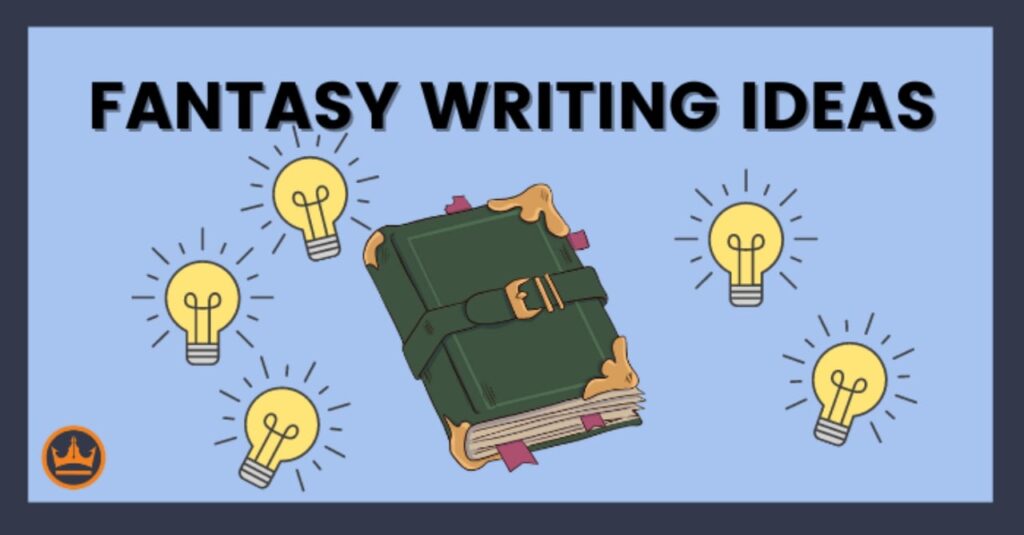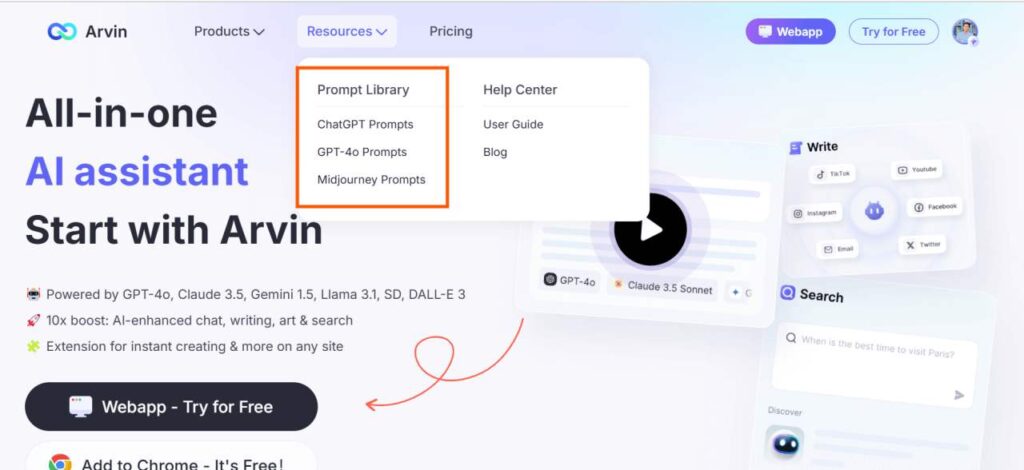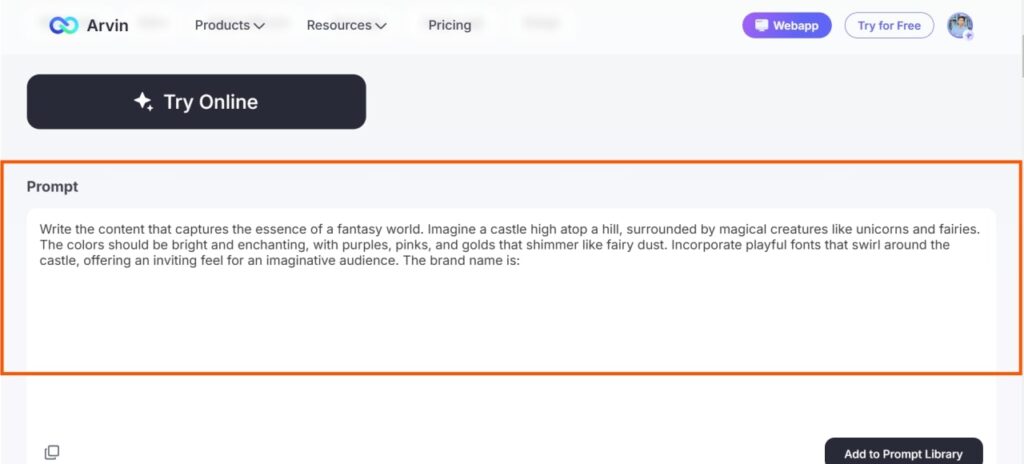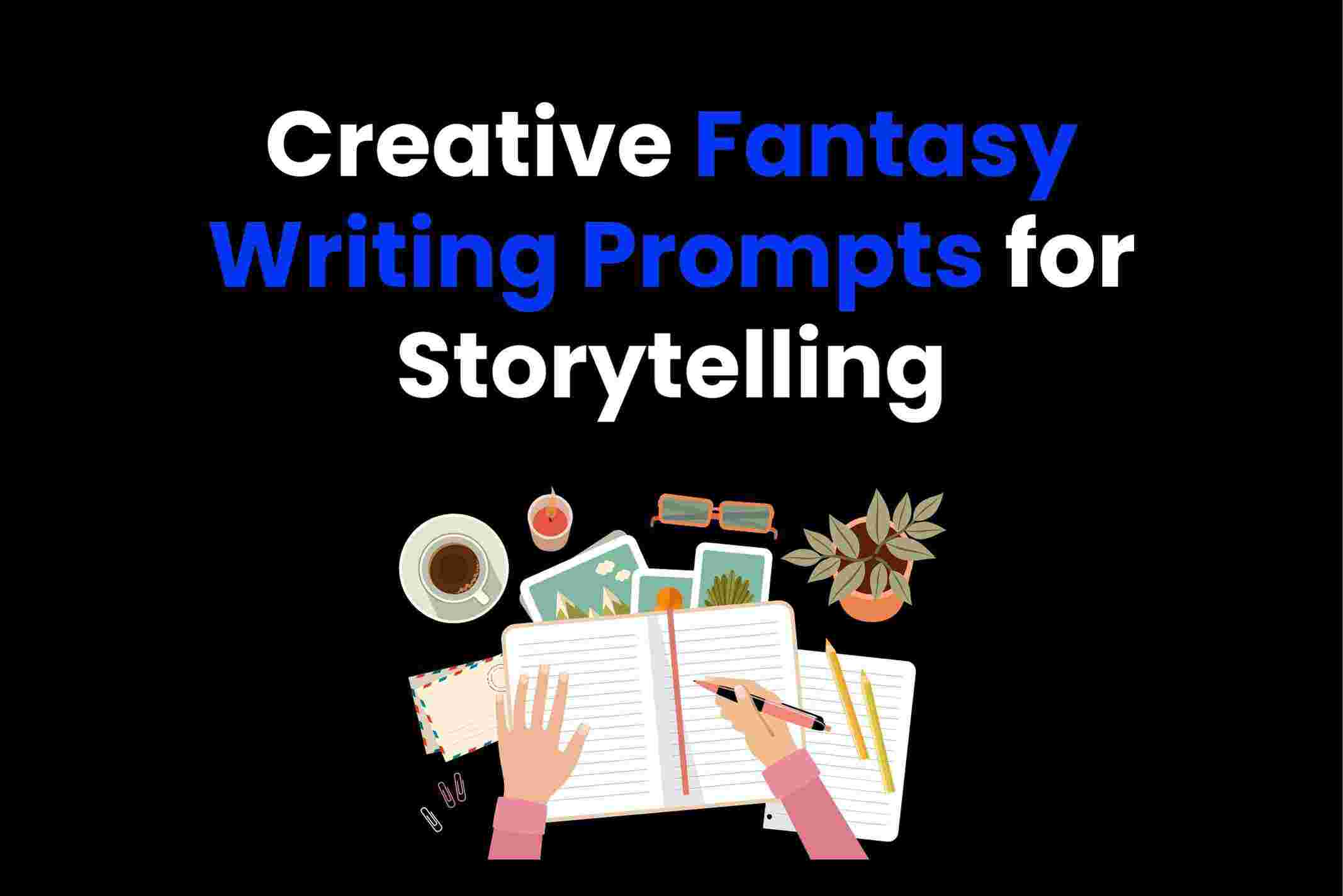Fantasy writing is a genre which lets each the reader or the writer learns about unlimited possibility, magic, and fantasy. Beginning to write your fantasy or being an experienced teller of stories, crafting strange and intriguing fantasies can sometimes prove difficult. That is where fantasy writing prompts come in-to spark something, shake your creativity, and turn inexact ideas into vivid narratives. This article is your ultimate guide to fantasy writing prompts, offering inspiration across a range of themes and subgenres. From enchanted artifacts to romantic crossovers, and even sci-fi blends, you’ll find prompts to help develop fascinating worlds and compelling characters.

What is Fantasy Writing?
Fantasy writing is a genre of fiction that feeds off magical ingredients, which is usually set in imaginative worlds or universes. Fantasy writing provides the means to design vast worlds with magic rule, physics, and society rules to consider heroism, morality, and the nature of good and evil.
Key Characteristics of Fantasy Writing
- Magic and Supernatural Elements: Magic can be used by characters who wield magical powers or by protagonists in some quest to achieve magical objects.
- Imaginary Worlds: full of strange creatures, uncharted lands, and fantastical settings-enchanted forests, islands floating in the air, and the like.
- Epic Themes: Many fantasy stories focus on epic struggles-political, moral, or spiritual-which parallel our own struggles with reality.
- Complex Characters and Societies: From the reluctant hero to the cunning villain, characters of fantasy fare can be multifaceted, and the societies from which they hail are complex and full of history.
Why Use Fantasy Writing Prompts?
Writing prompts act as a catalyst for creativity, helping writers move past writer’s block or jumpstart new projects. Prompts provide structure and direction, which is especially useful when you’re unsure of where to begin or are looking for fresh inspiration.
Benefits of Using Writing Prompts
- Sparking Creativity: It can help you brainstorm ideas you wouldn’t otherwise have stumbled upon-once as creative as a concept for world-building or a great character dynamic.
- Overcoming Writer’s Block: Often, when you’re stuck, a prompt is just what helps get you writing again, giving you something specific to focus on in your story.
- Building Consistency: Prompts can help establish recurring themes or characters, so there is a basis for doing long-term world-building and plot development.
- Experimentation: Prompts encourage experimentation. You may try out new ideas without the pressure of them needing to be developed into full-fledged stories right this instant.
How to Use Fantasy Writing Prompts Effectively
Begin with Broad Prompts
Too specific prompts can stifle creativity. So let’s begin with broad and open-ended ones, such as “A magic-wielding protagonist discovers an ancient city.” Then proceed to add details, complexity, and twists there.
Write Characters along with the Prompts
Use prompts both to build your world and to develop your characters. Consider how the prompt affects them. What would a brave knight do about a prophecy? What would a reluctant sorcerer do when magical events run out of control?
Modify Prompts to Fit Your Story
Feel free to adapt any prompt to your own interest or theme. If a prompt related to some magical artifact does not interest you, then twist it into something like a lost city or some hidden power. Prompts are flexible, and their real purpose is to inspire you.
How Fantasy Writing Prompts Help Improve Your Writing
Fostering Originality
Prompts nudge you to penetrate the veil of generic tropes and clichés that most productions use, coming up with original ideas that make your fantasy stories a novel creation. From creating new magic systems or designing an entirely new kind of creature, writing prompts will take you away from familiar ground.
Testing New Genres
Fantasy writing prompts can really thrust you into subgenres that you may not ever consider writing in. You could take a medieval fantasy prompt and turn it into an urban fantasy or steampunk story, changing magic with advanced technology.
Refining Writing Techniques
Experimentation on variations of prompts, this will also help you better recognize the sense of narrative pacing, character arcs, and plot formation. Composing short scenes inspired by prompts also enhances your style of descriptive writing.
The Role of Fantasy Writing in Creativity
Fantasy writing, especially when provoked by creative prompts, encourages creativity among not only the writer, but also the readers. Through imaginative world-building and descriptive narratives, authors create an escape where readers can experience new things and reflect on real-life concepts under the pragmatic veil of fantasy.
How Fantasy Writing Encourages Exploration
- Exploring Complex Themes: Fantasy works involve complex, heavy themes that carry more weight, such as morality, identity, and power—topics less likely to be discussed in other genres.
- Escaping Reality: Fantasy allows anything to happen. Writers can plunge into world-building, creating not just new lands but entire systems of magic, religion, and history to immerse readers.
- Pushing Boundaries: Fantasy writing allows writers to push the boundary’s of the traditional genres-experimentation with themes and storytelling techniques that might not fit within other frameworks.
Classic Fantasy Writing Prompts
Magical Competitions
Magical competitions are some of the staples of fantasy. Dramatic stakes and thrilling plotlines followed these present challenging situations for your characters and unveil deep motivations.
- Example Prompt: A kingdom declares a duel of magical familiars, wherein participants’ bonded creatures must battle to prove their worth. The grand prize? A powerful relic said to grant immortality.
- Idea Expansion: Introduce political drama. A contestant is an undercover spy attempting to destroy the competition for his own kingdom.
- Second Prompt: Two wizards compete in an old and archaic tournament, but clues gradually start revealing that the tasks are actually traps made by an evil entity.
Magical Objects
Magic objects have long been the defining staple of fantasy fiction, creating quests and unraveling mysteries.
- Example Prompt: A cursed necklace speaks to its wearer, guiding them to ancient treasures—but at a sinister cost.
- Idea Expansion: Introduce moral dilemmas. The artifact offers its powers but demands increasingly dark tasks.
- Another Prompt: A forgotten sword hungers for revenge against those who betrayed its creator. Whoever wields it becomes part of its vendetta.
Romantic Fantasy Prompts
Forbidden Love Across Realms
Forbidden love can make tension, drama, and interesting relationships.
- Example Prompt: There is a vampire prince falling in love with a fae princess with a mission to end centuries of war between their realms.
- Idea Expansion: Include a prophecy that their union will destroy both kingdoms.
- Another Prompt: A human knight finds that his true soulmate comes in the form of a dragon in disguise, where he has to choose between duty and love.
Love in Perilous Moments
Romantic stories in high-risk settings add to the emotional tension and stakes.
- Example Prompt: A healer and a cursed warrior find themselves working together during a magical plague, falling in love while racing against time to find a cure.
- Idea Expansion: Explore the inner torment of the cursed warrior in keeping their growing emotions locked down because of an expectation that the curse will destroy the lover.
- Another Prompt: Two agents from warring magical houses are trapped in a time loop, reliving the same day repeatedly until they learn to trust—and love—each other.
Sci-Fi and Fantasy Crossovers
Tech and Magic
Where Technology and Magic Reside: A world with futuristic tech and ancient magic is a recipe for some fascinating worlds and unique challenges.
- Example Prompt: A hacker accidentally makes a digital wizard while working with AI, which puts together the notions of science and magic.
- Idea Expansion: The hacker finds that their creation is developing and wants control over the real and digital worlds.
- Another Prompt: In a post-apocalyptic future, scavengers find a magical relic that challenges the balance of technological control.
Cosmic Beings and Mystical Wars
While fantasy tends to deal at more terrestrial levels of conflict, cosmic scenes bring the grandiosity and scope in a much bigger scale.
- Example Prompt: Alien deities wage mystic war over Earth by recruiting human creatures as pawns within their game of cosmic play.
- Idea Expansion: Introduce a mortal protagonist who inadvertently gains power rivaling those gods, necessitating unification of deities against him.
- Another Prompt: A space expedition discovers a mythical gate leading to a parallel realm dominated by an ancient sorcerer.
Dark Fantasy and Horror Prompts
Haunted Realms
Creepy landscapes and dark magic can inspire some refreshingly chilling tales.
- Example Prompt: A castle is cursed so that every mirror reflects a different timeline, with alternate versions of people living therein.
- Idea Expanding: The mirrors begin merging timelines, and chaos erupts as characters face their alternate selves.
- Another Prompt: A land in which the shades of death roam amongst the living, telling secrets and bringing cryptic warnings.
Monsters with a Twist
It’s the best way to add depth and complexity to your story by reimagining traditional monsters.
- Example Prompt: Friendly werewolf seeking shelter in a town but arrives in the middle of a series of gruesome murders, making them prime suspects.
- Idea Expansion: The true killer is a cursed villager, and the werewolf must expose the truth while avoiding persecution.
- Another Prompt: A banshee tasked with heralding deaths begins saving those they were meant to doom.
Encouragement Through Fantasy Prompts
Reviving Stale Plots
Fantasy prompts can breathe life into old or predictable storylines.
- Example Prompt: A secondary character often overlooked in your story discovers they hold the key to defeating the antagonist.
- Idea Expansion: Their dominance sets tension among the protagonists, innovators, who feel threatened by this drastic shift of dynamic.
- Another Prompt: The main antagonist is revealed to be a victim of some mighty curse as the focus turns from battle to redemption.
Creative Exercises for Writers
The best way prompts would unlock new creative avenues is through exercises.
Example Prompt: Write a scene in which a phoenix is reborn, but the rebirth is stained-darkly so in that it sucks away all memories of those who witness it.
Idea Expansion: Use this idea to address the ethics of immortality and theft of memory.
Writing Tips for Fantasy Stories
World-Building Fundamentals
A fantasy world needs to be built in order to believe in it:
- Geography: Create diverse lands that will affect travel, trade, and culture.
- Culture: Incorporate unique traditions, languages, and power structures.
- Magic Systems: Establish clear rules and limits to ensure consistency.
Understanding Your Audience
Knowing your target audience helps tailor your story effectively.
- Young Adult: Focus on coming-of-age themes and emotional arcs.
- Adult: Explore deeper, more complex narratives with moral ambiguity.
Starting Small
Short stories provide an excellent testing ground for larger ideas. Begin with a single setting, character, or conflict and expand from there.
How Fantasy Writing Prompts Help Improve Your Writing
Fostering Originality
Prompts nudge you to penetrate the veil of generic tropes and clichés that most productions use, coming up with original ideas that make your fantasy stories a novel creation. From creating new magic systems or designing an entirely new kind of creature, writing prompts will take you away from familiar ground.
Testing New Genres
Fantasy writing prompts can really thrust you into subgenres that you may not ever consider writing in. You could take a medieval fantasy prompt and turn it into an urban fantasy or steampunk story, changing magic with advanced technology.
Refining Writing Techniques
Experimentation on variations of prompts, this will also help you better recognize the sense of narrative pacing, character arcs, and plot formation. Composing short scenes inspired by prompts also enhances your style of descriptive writing.
The Role of Fantasy Writing in Creativity
Fantasy writing, especially when provoked by creative prompts, encourages creativity among not only the writer, but also the readers. Through imaginative world-building and descriptive narratives, authors create an escape where readers can experience new things and reflect on real-life concepts under the pragmatic veil of fantasy.
How Fantasy Writing Encourages Exploration?
- Exploring Complex Themes: Fantasy works involve complex, heavy themes that carry more weight, such as morality, identity, and power—topics less likely to be discussed in other genres.
- Escaping Reality: Fantasy allows anything to happen. Writers can plunge into world-building, creating not just new lands but entire systems of magic, religion, and history to immerse readers.
Pushing Boundaries: Fantasy writing allows writers to push the boundary’s of the traditional genres-experimentation with themes and storytelling techniques that might not fit within other frameworks.
Genre-Specific Fantasy Prompts
High Fantasy
Epic quests, along with political machination and intrigue, are hallmarks for this popular sub-genre.
Example Prompt: A rebellion led by dragons threatens an empire built on lies.
Urban Fantasy
Magic coexisted with modernity resulting in accessible yet otherworldly tales.
Example Prompt: A magical council of sorts runs a cosmopolitan city, but an rogue sorcerer wants to expose their existence.
Steampunk Fantasy
Victorian sensibilities with sci-fi type tech
Example Prompt: A clockwork automaton begins to develop free will, causing its master to question his philosophy.
Advanced Fantasy Writing Techniques
Creating Iconic Characters
Iconic characters have flaws, strengths, and relatable characteristics. Avoid stereotypes, even secondary characters, with unique quirks or motivations.
Plot Twists and Surprises
Keep your readers in suspense with creative plot twists. Make sure that your surprises add to the context rather than detract from it.
Arvin AI: Empowering Writers with Creativity
Arvin AI – in today’s digital world, this makes all the difference in writing. This could be anything from designing highly complex fantasy worlds to designing relatable characters; the suite of its features intended by Arvin AI aim at making the creative process much easier and better. Designed for the divergent need of the storytellers, Arvin AI is the latest addition to a writing assistant. Its intuitive interface and advanced algorithms empower. The generic writing tool, Arvin AI, understands the nuances of creative genres, and has particular guidance for fantasy, sci-fi, romance, etc.
Key Features of Arvin AI
- Brainstorm Ideas: Generates innovative concepts for characters, settings, and plotlines to help you overcome creative blocks.
- Organize Stories: Organizes timelines, plot arcs, and character development to flow smoothly.
- Polish Writing: Uses grammar checks and stylized enhancements to develop your writing and make it easier to read.
- Genre-Specific Help: Tailors suggestions for the fantasy, sci-fi, romance genre to your story’s tone.
- Prompt Customization: Designs in-depth customized prompts based on your themes or ideas to encourage unique storylines and dialogues.
Using Arvin AI’s Writer for Fantasy Prompts writing
1: Open Arvin AI and choose the prompt generator tool from the main page.

2: Enter a about your fantasy and click the search.

3: Click the different types of prompts for generating Fantasy you can click on any one.
4: Review the generated prompt, make any edits to personalize it, and integrate it into your draft to enhance your fantasy narrative.

Conclusion
Altogether, fantasy writing prompts are an excellent way to kindle the imagination and make the storyline rich for a writer. It permits authors to look into a new world, build complex characters, and discover innovative plot twists. A writer’s imagination can be fueled with or without experience by using these prompts. In fact, Arvin AI is one of the versatile writing companions because of its name generation, designing logos, and even suggestions for building scenes. This means incorporating Arvin AI into the process of writing to make it easier to flesh out your worlds and more lush fantasy stories- as such, a very useful tool for any writer looking to level up their craft.
FAQs
Fantasy writing prompts are little ideas or scenarios that can be used to prompt creativity in a writer. These may help writers with new character ideas, settings, or plot lines. Prompts could help to overcome a case of writer’s block or as something more creative to start off new stories or scenes.
Fantasy prompts are excellent world-building tools because they challenge the writer to think in more details into their settings. Magic system, political or mythical creatures prompts help expand and deepen the scope of your world, thus turning it bigger and believable.
Yes! Prompts can be used for discovering new character traits, motivations, or conflicts. Take the example of a forbidden magical artifact where a prompt can develop the backstory or personal journey of a character, enriching your characters.
You can integrate prompts by weaving them into ongoing storylines. For instance, a prompt about the magical competition might be a challenge or an antagonist whom you use to add complexity and variety to your existing storyline. You can really use prompts well when you want to expand plots with twists that surprise everyone.






